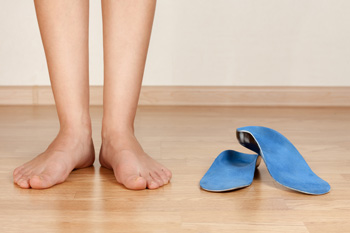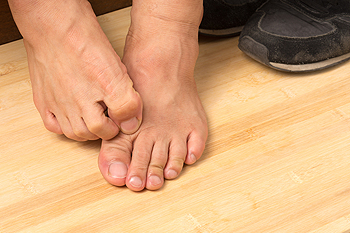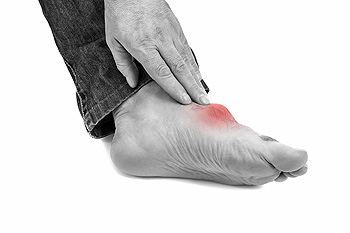October 2020
Should I Get Orthotics?
 Orthotics are devices made of molded rubber, leather, metal, plastic, or other synthetic material that are placed into the shoes in order to balance the foot in a neutral position and cushion it. A podiatrist may recommend or prescribe a custom orthotic if you have specific foot problems, such as an unusually shaped foot or over pronated feet when walking. They may also be prescribed to help with foot pain caused by medical conditions such as diabetes, plantar fasciitis, and arthritis. If you don’t necessarily want to invest in an expensive custom-made orthotic, drugstores, supermarkets, and sporting goods stores all sell generic orthotics which may help relieve general foot pain. For more information about orthotics, speak with a podiatrist today.
Orthotics are devices made of molded rubber, leather, metal, plastic, or other synthetic material that are placed into the shoes in order to balance the foot in a neutral position and cushion it. A podiatrist may recommend or prescribe a custom orthotic if you have specific foot problems, such as an unusually shaped foot or over pronated feet when walking. They may also be prescribed to help with foot pain caused by medical conditions such as diabetes, plantar fasciitis, and arthritis. If you don’t necessarily want to invest in an expensive custom-made orthotic, drugstores, supermarkets, and sporting goods stores all sell generic orthotics which may help relieve general foot pain. For more information about orthotics, speak with a podiatrist today.
If you are having discomfort in your feet and would like to try orthotics, contact Dr. Steven Schwartz from Pennsylvania. Our doctor can provide the care you need to keep you pain-free and on your feet.
What Are Orthotics?
Orthotics are inserts you can place into your shoes to help with a variety of foot problems such as flat feet or foot pain. Orthotics provide relief and comfort for minor foot and heel pain but can’t correct serious biomechanical problems in your feet.
Over-the-Counter Inserts
Orthotics come in a wide variety of over-the-counter inserts that are used to treat foot pain, heel pain, and minor problems. For example, arch supports can be inserted into your shoes to help correct overarched or flat feet, while gel insoles are often used because they provide comfort and relief from foot and heel pain by alleviating pressure.
Prescription Orthotics
If over-the-counter inserts don’t work for you or if you have a more severe foot concern, it is possible to have your podiatrist prescribe custom orthotics. These high-quality inserts are designed to treat problems such as abnormal motion, plantar fasciitis, and severe forms of heel pain. They can even be used to help patients suffering from diabetes by treating foot ulcers and painful calluses and are usually molded to your feet individually, which allows them to provide full support and comfort.
If you are experiencing minor to severe foot or heel pain, it’s recommended to speak with your podiatrist about the possibilities of using orthotics. A podiatrist can determine which type of orthotic is right for you and allow you to take the first steps towards being pain-free.
If you have any questions please contact our offices located in Chambersburg, and Mcconnellsburg, PA . We offer the newest diagnostic and treatment technologies for all your foot and ankle needs.
What Should I Do if I Have Athlete's Foot?
 Tinea pedis, or Athlete’s foot as it is more commonly known, is a fungal infection of the skin and feet. It typically affects the spaces between the toes and is characterized by cracked, scaly skin. This infection is contagious and can be spread through contact with infected skin flakes or through contact with fungi in damp areas, such as public swimming pools. If you find yourself with athlete’s foot, it is important to keep the feet clean, dry, and cool, as the fungus thrives and multiplies in warm, moist environments. You should also avoid public swimming pools, public showers, and foot baths. Wear sandals if possible, or air out your shoes by alternating them every 2-3 days. Avoid wearing socks made from fabrics like nylon, which do not dry easily. Finally, follow your doctor’s prescribed treatments, which can include topical or oral antifungal medications. If you think that you may have athlete’s foot, it is suggested that you seek the care of a podiatrist.
Tinea pedis, or Athlete’s foot as it is more commonly known, is a fungal infection of the skin and feet. It typically affects the spaces between the toes and is characterized by cracked, scaly skin. This infection is contagious and can be spread through contact with infected skin flakes or through contact with fungi in damp areas, such as public swimming pools. If you find yourself with athlete’s foot, it is important to keep the feet clean, dry, and cool, as the fungus thrives and multiplies in warm, moist environments. You should also avoid public swimming pools, public showers, and foot baths. Wear sandals if possible, or air out your shoes by alternating them every 2-3 days. Avoid wearing socks made from fabrics like nylon, which do not dry easily. Finally, follow your doctor’s prescribed treatments, which can include topical or oral antifungal medications. If you think that you may have athlete’s foot, it is suggested that you seek the care of a podiatrist.
Athlete’s foot is an inconvenient condition that can be easily reduced with the proper treatment. If you have any concerns about your feet and ankles, contact Dr. Steven Schwartz from Pennsylvania. Our doctor will treat your foot and ankle needs.
Athlete’s Foot: The Sole Story
Athlete's foot, also known as tinea pedis, can be an extremely contagious foot infection. It is commonly contracted in public changing areas and bathrooms, dormitory style living quarters, around locker rooms and public swimming pools, or anywhere your feet often come into contact with other people.
Solutions to Combat Athlete’s Foot
- Hydrate your feet by using lotion
- Exfoliate
- Buff off nails
- Use of anti-fungal products
- Examine your feet and visit your doctor if any suspicious blisters or cuts develop
Athlete’s foot can cause many irritating symptoms such as dry and flaking skin, itching, and redness. Some more severe symptoms can include bleeding and cracked skin, intense itching and burning, and even pain when walking. In the worst cases, Athlete’s foot can cause blistering as well. Speak to your podiatrist for a better understanding of the different causes of Athlete’s foot, as well as help in determining which treatment options are best for you.
If you have any questions please feel free to contact our offices located in Chambersburg, and Mcconnellsburg, PA . We offer the newest diagnostic and treatment technologies for all your foot and ankle needs.
Gout 101
 Gout is a form of inflammatory arthritis that affects the big toe and can cause severe joint pain. Gout is three times more likely to affect men than women. A proper diagnosis will require a podiatrist to assess the foot and rule out other possible diagnoses. Upon a gout diagnosis, medications such as anti-inflammatory drugs or corticosteroids may be prescribed. However, the typical primary treatment method for gout involves reducing uric acid levels in the blood. While there are many prescriptions that may help reduce these levels, diet is key. Avoiding high purine foods, sugary drinks, and alcohol will help reduce uric acid levels. If you believe that you are suffering from gout, consult with a podiatrist for a proper diagnosis and treatment.
Gout is a form of inflammatory arthritis that affects the big toe and can cause severe joint pain. Gout is three times more likely to affect men than women. A proper diagnosis will require a podiatrist to assess the foot and rule out other possible diagnoses. Upon a gout diagnosis, medications such as anti-inflammatory drugs or corticosteroids may be prescribed. However, the typical primary treatment method for gout involves reducing uric acid levels in the blood. While there are many prescriptions that may help reduce these levels, diet is key. Avoiding high purine foods, sugary drinks, and alcohol will help reduce uric acid levels. If you believe that you are suffering from gout, consult with a podiatrist for a proper diagnosis and treatment.
Gout is a painful condition that can be treated. If you are seeking treatment, contact Dr. Steven Schwartz from Pennsylvania. Our doctor will treat your foot and ankle needs.
What Is Gout?
Gout is a form of arthritis that is characterized by sudden, severe attacks of pain, redness, and tenderness in the joints. The condition usually affects the joint at the base of the big toe. A gout attack can occur at any random time, such as the middle of the night while you are asleep.
Symptoms
- Intense Joint Pain - Usually around the large joint of your big toe, and it most severe within the first four to twelve hours
- Lingering Discomfort - Joint discomfort may last from a few days to a few weeks
- Inflammation and Redness -Affected joints may become swollen, tender, warm and red
- Limited Range of Motion - May experience a decrease in joint mobility
Risk Factors
- Genetics - If family members have gout, you’re more likely to have it
- Medications - Diuretic medications can raise uric acid levels
- Gender/Age - Gout is more common in men until the age of 60. It is believed that estrogen protects women until that point
- Diet - Eating red meat and shellfish increases your risk
- Alcohol - Having more than two alcoholic drinks per day increases your risk
- Obesity - Obese people are at a higher risk for gout
Prior to visiting your podiatrist to receive treatment for gout, there are a few things you should do beforehand. If you have gout you should write down your symptoms--including when they started and how often you experience them, important medical information you may have, and any questions you may have. Writing down these three things will help your podiatrist in assessing your specific situation so that he or she may provide the best route of treatment for you.
If you have any questions, please feel free to contact our offices located in Chambersburg, and Mcconnellsburg, PA . We offer the newest diagnostic and treatment technologies for all your foot care needs.
Rheumatoid Arthritis and the Feet
 Rheumatoid arthritis (RA) is an autoimmune condition that causes chronic inflammation of the joints and frequently affects the joints of the feet and ankles. In fact, more than 90% of people with RA develop symptoms in the foot and ankle. This condition can make it difficult to walk and may cause pain in the feet. RA can also make you more likely to develop other foot problems, such as collapsed arches, corns, calluses, bunions, hammertoes, and large bony bumps on the ball of the foot,. If you have been diagnosed with RA and experience symptoms in the feet and ankles, it is highly suggested that you are under the care of a podiatrist. A podiatrist can monitor your feet and ankles, prescribe various treatments, and help you maintain your mobility and quality of life.
Rheumatoid arthritis (RA) is an autoimmune condition that causes chronic inflammation of the joints and frequently affects the joints of the feet and ankles. In fact, more than 90% of people with RA develop symptoms in the foot and ankle. This condition can make it difficult to walk and may cause pain in the feet. RA can also make you more likely to develop other foot problems, such as collapsed arches, corns, calluses, bunions, hammertoes, and large bony bumps on the ball of the foot,. If you have been diagnosed with RA and experience symptoms in the feet and ankles, it is highly suggested that you are under the care of a podiatrist. A podiatrist can monitor your feet and ankles, prescribe various treatments, and help you maintain your mobility and quality of life.
Arthritis can be a difficult condition to live with. If you are seeking treatment, contact Dr. Steven Schwartz from Pennsylvania. Our doctor can provide the care you need to keep you pain-free and on your feet.
Arthritic Foot Care
Arthritis is a joint disorder that involves the inflammation of different joints in your body, such as those in your feet. Arthritis is often caused by a degenerative joint disease and causes mild to severe pain in all affected areas. In addition to this, swelling and stiffness in the affected joints can also be a common symptom of arthritis.
In many cases, wearing ill-fitting shoes can worsen the effects and pain of arthritis. Wearing shoes that have a lower heel and extra room can help your feet feel more comfortable. In cases of rheumatoid arthritis, the arch in your foot may become problematic. Buying shoes with proper arch support that contour to your feet can help immensely.
Alleviating Arthritic Pain
- Exercises that stretch the foot can prevent further pain and injury and increase mobility
- Most of the pain can be alleviated with anti-inflammatory drugs, heat, and topical medications
- Massages can help temporarily alleviate pain.
It is best to see your doctor for the treatment that is right for your needs and symptoms. Conditions vary, and a podiatrist can help you determine the right method of care for your feet.
If you have any questions, please feel free to contact our offices located in Chambersburg, and Mcconnellsburg, PA . We offer the newest diagnostic tools and technology to treat your foot and ankle needs.


